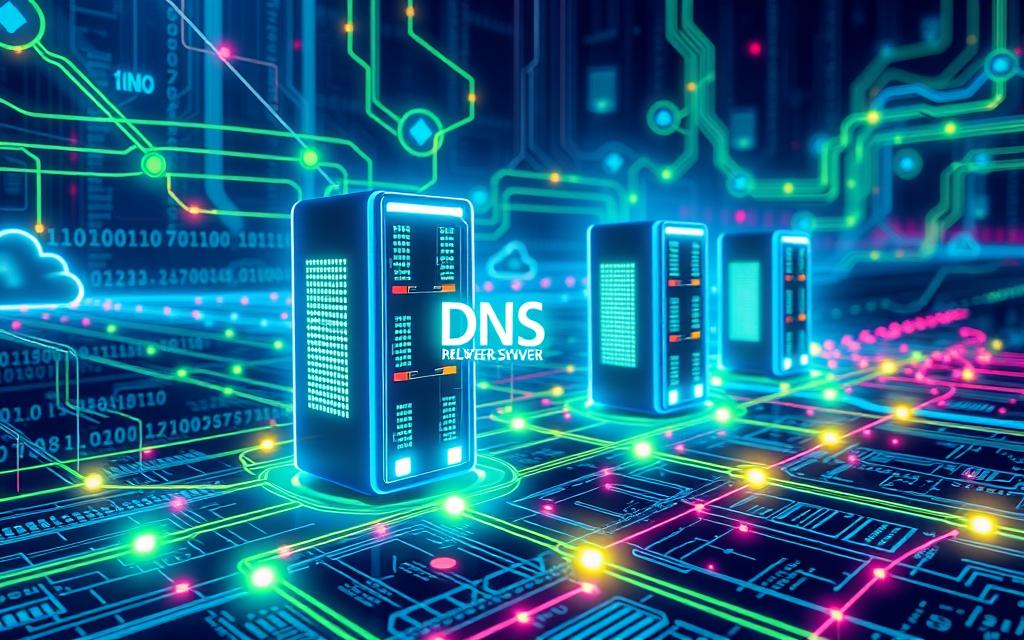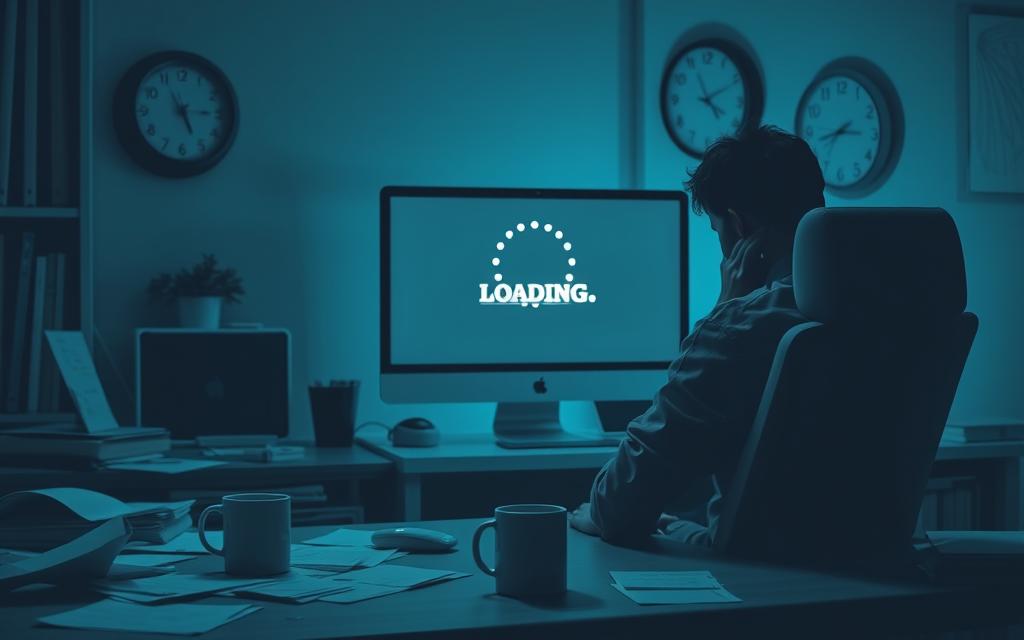Troubleshooting Slow Web Page Loading on Your Computer
In today’s fast world, web page speed is key. Google’s Core Web Vitals, like Largest Contentful Paint (LCP) and First Input Delay (FID), check site speed. A slow page can harm user experience and search rankings.
There are ways to make your website faster. Knowing how to spot and fix common problems can help. This ensures your site is quick and engaging for visitors.
This guide will cover why pages load slowly and how to fix it. It’s for website owners, developers, and anyone wanting a better browsing experience. You’ll learn how to speed up your computer’s web page loading.
Understanding Website Loading Speed Fundamentals
Speed is key when it comes to web browsing. How browsers handle web pages greatly affects our experience. Many of us think web pages take longer to load than they really do. We believe we spend almost two days waiting for slow sites to load.
How Browsers Process Web Pages
Browser processing involves several steps. These include asking for data from servers, showing content, and running scripts. How well and fast these steps are done can greatly affect how we see a website’s performance.
Impact of Loading Speed on User Experience
How fast a website loads can really impact us. A 1-second delay can cut conversions by 7%. If a site takes more than 3 seconds to load, 40% of visitors will leave. Slow loading times can also hurt a site’s SEO and mobile ad earnings.
Common Speed Metrics and Benchmarks
Experts use different metrics to check website speed. These include Largest Contentful Paint (LCP), First Input Delay (FID), and Time to First Byte (TTFB). Sites should load in under 3 seconds to keep users. Top browsers aim for loads under 0.5 seconds.
“Seamless experiences and flow in web interactions are linked to human happiness, influenced by our evolutionary behaviour of performing actions in beautiful, sequential flows.”
Knowing how browsers process web pages, the effect of speed on user experience, and common metrics helps. Website owners and developers can then work to make their sites faster. This leads to better user satisfaction.
Poor Server Performance and Its Effects
Server performance is key to your website’s speed. Sadly, many sites face slow server issues. This can harm user experience and business success.
Using cheap, shared hosting is common. It’s affordable but divides resources among many sites. This makes things slower. The server’s location also matters. Being far from users means longer waits.
| Server Performance Metric | Ideal Range | Impact on User Experience |
|---|---|---|
| Server Response Time | Under 200ms | Faster response times provide a smooth, seamless user experience. |
| Server Uptime | 99.9% or higher | Consistent availability ensures users can access your website whenever they need to. |
| Server Bandwidth | Sufficient for peak traffic | Adequate bandwidth prevents bottlenecks and ensures rapid content delivery. |
To fix slow servers, think about better web hosting. Options like dedicated servers or virtual private servers (VPS) offer more power. They make your site faster. Also, a Content Delivery Network (CDN) can help. It caches content near users, cutting down on wait times.
“Every second of delay increases bounce rates, resulting in lost conversions and lower revenue.”
Improving server performance makes your site fast and efficient. This gives users a great experience. It also helps your site make more money.
Why Your Computer Very Slow Loading Web Pages
Slow web page loading on your computer might be due to several reasons. These include browser problems, hardware issues, and network setup problems. Let’s look at these causes and find ways to make your web browsing faster.
Browser-Related Issues
Using an outdated or poorly set up browser can slow down your computer. Too many browser extensions or wrong settings can also cause delays. Here are some steps to fix these problems:
- Make sure your web browser is the latest version. This often brings better performance and browser optimisation.
- Check and manage your browser’s extensions and add-ons. Disable or remove any that are not needed or cause trouble.
- Optimise your browser’s settings. Clear the cache, adjust its size, and turn off features you don’t use.
Hardware Limitations
Old or weak hardware can also slow down your computer. If your computer can’t handle modern web content, it will load pages slowly. Here are some hardware solutions:
- Adding more RAM can help your computer handle web browsing tasks better.
- Upgrading to a newer, faster processor can improve your system’s performance.
- Switching to a solid-state drive (SSD) can make data access and loading much faster.
Network Configuration Problems
Network problems, like DNS settings or bandwidth issues, can also slow down web pages. Fixing these network problems can make your browsing faster. Try these steps:
| Problem | Solution |
|---|---|
| DNS Configuration Issues | Flush your DNS cache or try using alternative DNS servers, such as those provided by Google or Cloudflare. |
| Bandwidth Limitations | Check your internet service plan and consider upgrading to a higher-speed package if your current plan is not meeting your needs. |
By fixing browser, hardware, and network problems, you can make web pages load faster on your computer. This will improve your web browsing experience.
The Role of Internet Connection in Page Loading
When you’re trying to fix slow webpage loading, your internet connection is key. An internet speed test can check if your speed matches what your provider says. Latency, or ping time, also matters a lot, even if your speed is good. The distance to the web server can make a big difference in how fast you can browse.
Internet Service Providers (ISPs) might slow down certain websites or services. This is called throttling. Using a Virtual Private Network (VPN) can help get around this problem. Also, making sure your router is set up right and maybe getting a faster internet plan can boost your connection stability and speed.
| Metric | Optimal Value | Impact on Loading |
|---|---|---|
| Bandwidth | 120 Mbps download, 35 Mbps upload | Sufficient bandwidth ensures smooth page loading |
| Latency (Ping) | Less than 50 ms | High latency can cause lag and slow page rendering |
| Packet Loss | 0% | Packet loss can disrupt data transmission, leading to slow or incomplete page loading |
By focusing on these important parts of your internet connection, you can make webpages load faster. This will make your browsing experience much better.
Browser Caching and Its Impact on Loading Speed
In today’s fast-paced digital world, quick access to online content is key. Browser caching plays a crucial role in achieving this. It stores data locally on your computer, making websites load faster. This means less time waiting for pages to load, making browsing smoother.
How Caching Works
When you visit a website, your browser saves copies of important files. This includes HTML, images, and scripts. On future visits, it uses these saved copies instead of asking the server again. This makes pages load much quicker.
Clearing Cache Effectively
Even though caching is great, it’s important to clear it sometimes. Old cache can cause problems like outdated content. Clearing it ensures you see the latest website version and avoids loading issues.
Optimising Cache Settings
Website owners need to adjust cache settings for the best experience. They must balance how long cached data is kept and how often content changes. This way, they can make websites load fast and keep content fresh.
In summary, browser caching is vital for performance optimisation. Knowing how it works and managing it well can make websites load faster. This leads to a better online experience for everyone.
Network Configuration and DNS Settings
Getting your network set up right is key for fast web page loading. One important step is to tweak your DNS (Domain Name System) settings. Using faster DNS servers, like Cloudflare’s 1.1.1.1, can really cut down the time it takes to find websites.
Also, making sure your network adapter settings are top-notch can make a big difference. It’s vital to fix any TCP/IP issues that might slow you down.
Explore DNS Server Options
- Think about switching to faster DNS servers like Cloudflare’s 1.1.1.1 or Google’s 8.8.8.8. They’re known for being quick and reliable.
- Don’t set up public DNS addresses on your workstations. It could be risky for your security.
- Set up your DNS servers with external forwarders for a safe business setup.
- Try out different public DNS servers to find the fastest one for your network.
Optimise Network Adapter Settings
- Check your network adapter settings to make sure they’re working well.
- Fix any TCP/IP problems that might be slowing down your web pages.
- Use tools like DNSBench and DNSQuerySniffer to check your DNS server’s performance.
| Metric | Recommendation |
|---|---|
| DNS Lookup Time | Ideally less than 100 ms, preferably under 50 ms, for optimal user experience. |
| Network Latency | Keep network latency low for quick data transfer and page loading. |
| Packet Loss | Find and fix any packet loss problems that affect your network. |
By tweaking your network and DNS settings, you can make your web browsing much faster. Keep an eye out for problems and use different fixes to keep your network running smoothly.

Impact of Browser Extensions and Add-ons
Browser extensions can make our online life better, but too many can slow things down. It’s important to check and remove any extensions you don’t need. This way, you free up resources and make your browser faster.
Identifying Problematic Extensions
Not every extension is the same. Some use a lot of memory or CPU, making pages load slowly. Use your browser’s task manager to see which extensions are using too much. This helps you decide which ones to keep or delete.
Managing Browser Resources
- Think about how many browser plugins you have. More extensions mean more resources used.
- Check and audit your extensions often to find any that slow you down.
- Get rid of any extensions you don’t use to save system resources.
Alternative Browser Solutions
If your browser is slow, try a lightweight browser. These browsers are made for better extension auditing and speed. They load pages faster and work more smoothly.
“Optimising your browser’s performance is a crucial step in ensuring a smooth and efficient web browsing experience.”
By managing your extensions well and trying new browsers, you can make your web browsing better. This improves your productivity and enjoyment online.
Hardware-Related Solutions for Faster Loading
If your computer is slow, upgrading your hardware might help. Optimising your system’s key parts can make browsing faster.
Switching to a Solid State Drive (SSD) is a great start. SSDs are much faster than old hard drives. They make your computer feel new again.
Also, think about adding more RAM. More RAM means your computer can do more things at once. For a 32-bit system, 4GB is the minimum. For 64-bit systems, 8GB or more is better.
Make sure your CPU can handle today’s websites. Older CPUs might struggle. If your CPU is weak, consider a new one or learn how to make it better.
Fixing these hardware issues can make your computer fast again. You’ll enjoy browsing the web without any delays.
| Upgrade | Benefit | Recommended Minimum |
|---|---|---|
| Solid State Drive (SSD) | Faster data access, reduced boot and load times | 1TB SSD |
| RAM Expansion | Improved multitasking and page rendering | 8GB for 64-bit systems |
| CPU Upgrade | Enhanced performance for modern web technologies | Intel Core i5 or AMD Ryzen 5 |
“My computer is just running too slow!” – Common phrase heard in the computer repair industry.
Advanced Troubleshooting Techniques
Improving your website’s speed is key for a great user experience and staying ahead. If simple steps don’t work, it’s time for more advanced methods. Using top developer tools, performance software, and network tools can help find and fix slow loading issues.
Using Developer Tools
Browser tools like Chrome DevTools give deep insights into your site’s speed. They help spot loading problems, show resource charts, and explain timing. By looking at network requests and script execution, you can find and fix slow spots.
Performance Monitoring
Performance tools like Google PageSpeed Insights and WebPageTest offer a full view of your site’s speed. They report on what affects page loading, like compression and server times. Regular checks help find and improve slow areas.
Network Analysis Tools
For network issues, tools like Wireshark are essential. They let you see network traffic, find connection problems, and solve complex setups. By looking at packet data and DNS, you can fix slow loading caused by the network.
Using these advanced methods can fix the biggest speed problems. Regular checks and data analysis are crucial for keeping your site fast. This ensures your users have a quick and smooth experience.
| Tool | Functionality | Key Benefits |
|---|---|---|
| Chrome DevTools | Browser-based developer tools for inspecting and debugging web pages | Identify specific loading issues, analyse resource waterfall charts, and interpret timing data |
| Google PageSpeed Insights | Online tool for evaluating website performance and providing recommendations | Detailed reports on factors influencing page rendering, including resource compression, caching, and server response times |
| WebPageTest | Web performance testing tool that simulates real-world user experiences | Comprehensive analysis of website loading speed, resource optimization, and user experience metrics |
| Wireshark | Network protocol analyser used to capture and inspect network traffic | Diagnose and troubleshoot complex network-related issues, such as connectivity problems and DNS resolution |
VPN and Proxy Considerations
Virtual Private Networks (VPNs) and proxy servers can affect how fast web pages load. They help get around some restrictions or slow speeds from Internet Service Providers (ISPs). But, they might also slow things down a bit.
The speed of VPNs and proxies depends on several things. These include how close the server is to you, how busy the server is, and the network it’s on.
Studies show that 30-40% of slow speeds with VPNs or proxies come from network problems. About 20-30% of issues are due to antivirus programs that slow down your internet. Also, 15-25% of problems are caused by misconfigured routers.
To make your VPN or proxy faster, pick servers near you. Choose premium services like NordVPN with lots of servers. They offer 6900 servers in 111 countries for better speeds.
Try adjusting your VPN’s encryption settings. Avoid busy servers and check if your ISP is slowing you down. These steps can make your browsing faster.
FAQ
What impact can slow loading web pages have on user experience and search engine rankings?
Slow web pages hurt user experience and search rankings. Google looks at Largest Contentful Paint (LCP) and First Input Delay (FID) for site speed. Pages slow if they take over 2.5 seconds to load or take 100 milliseconds to interact.
Google’s PageSpeed Insights can measure these and show where to improve.
How does browser processing affect loading speed?
Browser processing includes getting data, showing content, and running scripts. Fast loading is key, with 47% wanting pages to load in 2 seconds. A 1-second delay can cut conversions by 7%.
Metrics like LCP, FID, and Time to First Byte (TTFB) are important. Pages should load in 3 seconds to keep users.
What role does server performance play in website speed?
Server performance is key for website speed. Cheap hosting can slow sites down because of shared resources. Server location also matters, with distance causing delays.
Upgrading hosting or using Content Delivery Networks (CDNs) can help a lot.
What factors can cause slow loading on your computer?
Slow loading can come from old browsers, too many extensions, or wrong settings. Not enough RAM or old processors also slow things down. Network problems, like DNS issues or bandwidth limits, can also slow you down.
Fixing these problems can make web pages load faster.
How does the quality of your internet connection affect loading speeds?
Your internet connection quality greatly affects loading speeds. Do speed tests to check if your connection is as fast as advertised. Some ISPs might slow down certain websites.
Using a VPN can sometimes get around this. Make sure your router is set up right and think about upgrading your internet if needed.
How can browser caching impact website performance?
Browser caching saves data locally, making repeat visits faster. Proper caching can really boost website speed. Clearing cache can fix some loading problems.
Optimising cache settings means finding the right balance between storage and content updates.
What network configuration changes can improve page loading speed?
Right network settings are vital for fast loading. Try using faster DNS servers like Cloudflare’s 1.1.1.1. Make sure your network adapter settings are for performance.
Check for any TCP/IP issues that might slow you down.
How can browser extensions and add-ons affect loading speeds?
Too many browser extensions can slow down loading. Regularly check and remove unused extensions. Use browser task managers to find resource-heavy ones.
Consider using lightweight browsers for better performance. Some extensions, like ad-blockers, can actually speed things up.
What hardware upgrades can help improve web browsing speed?
Upgrading hardware can make web browsing faster. Switching to an SSD can cut down on boot and load times. More RAM means you can multitask better and pages load faster.
Make sure your CPU can handle modern web stuff. Upgrading your graphics card can also help with graphics-heavy sites.
What advanced troubleshooting techniques can be used to identify loading issues?
Use browser developer tools to find loading problems. Performance monitoring tools can show where things slow down. Network analysis tools like Wireshark can help with complex issues.
Learn to read waterfall charts and timing data to improve loading sequences.
How can VPNs and proxies affect web page loading speeds?
VPNs and proxies can change web page loading speeds. They can bypass restrictions but may add latency. Choose VPN servers close to you for better speed.
Some proxies can speed up loading by caching content. Think about the trade-offs between security, privacy, and speed when using these services.















2 Comments